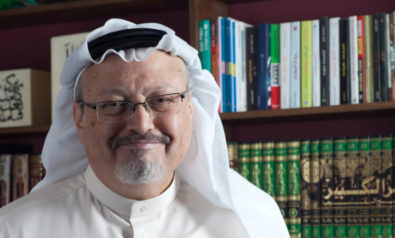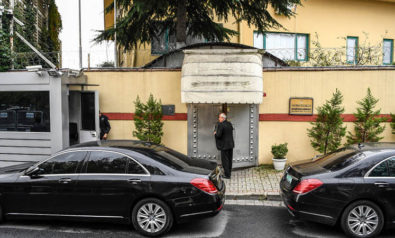In late 2018, Fair Observer published many articles on the killing of Jamal Khashoggi. In an editorial decision, we decided to publish a 360⁰ series and an e-magazine on the subject one year after his death. We are doing so because freedom of the press matters and his murder raises deeply uncomfortable questions about the nature of the world we live in.
The Story of Jamal Khashoggi
On October 2, 2018, Jamal Khashoggi stepped into the Saudi consulate in Istanbul never to return. Hatice Cengiz, his Turkish fiancée, kept waiting outside for more than 10 hours to no avail.
Khashoggi was a prominent Saudi journalist. He had covered major stories in the past such as the Soviet invasion of Afghanistan and the rise of Osama bin Laden. Khashoggi had been close to the Saudi royal family and had even acted as an adviser to the government.
Scroll down to read more on this 360° series
In 2017, the journalist well out of favor in Saudi Arabia and went into self-imposed exile in the US. He began writing columns for The Washington Post. His last opinion piece was titled, “What the Arab world needs most is free expression” and argued for “a modern version of the old transnational media so citizens can be informed about global events.” In a powerful article, Khashoggi bemoaned the Arab version of Iron Curtain “imposed not by external actors but through domestic forces vying for power.”
Khashoggi’s criticism of Saudi Arabia, Egypt and other Arab governments clearly touched a raw nerve. After his disappearance, Saudi Arabia “consistently denied any knowledge of Khashoggi’s fate.” In an interview with Bloomberg, Crown Prince Mohammed bin Salman claimed that his understanding was that Khashoggi left the Saudi consulate “after a few minutes or one hour.”
After Turkey presented mounting evidence that could not be ignored, Saudi Arabia changed its tune on October 20, 2018. It said Khashoggi had died in a fight resisting attempts to bring him back to Saudi Arabia. Yet the Saudis kept offering conflicting accounts till November 15 when they finally admitted that the journalist had been murdered in the consulate. The Saudis blamed “rogue individuals” for the murder, made a few arrests and conducted a trial behind closed doors.
Turkish President Recep Tayyip Erdoğan claimed that Khashoggi “was killed in cold blood by a death squad” and “that his murder was premeditated.” Although Erdoğan exonerated King Salman, he maintained that the order to kill Khashoggi had come from “the highest levels of the Saudi government.”
In June 2019, UN Special Rapporteur Agnes Callamard came to a similar conclusion as Erdoğan. For her, Khashoggi’s death “constituted an extrajudicial killing for which the state of the Kingdom of Saudi Arabia [was] responsible.” Callamard found there was “credible evidence” to warrant an investigation into Prince Mohammed and other high-level Saudi officials. She also argued that the prince should be subject to the targeted sanctions.
Why Does the Murder of Jamal Khashoggi Matter?
The killing of journalists is not new. The Committee to Protect Journalists has estimated that 1,335 journalists were murdered between 1992 and 2018. In 2017, UNESCO published a report on world trends in freedom of expression. It examined press freedom along four key dimensions: “(i) media freedom, (ii) media pluralism, (iii) media independence and (iv) safety of journalists.”
The report looked at the period between 2012 and 2017. It found that, though the number of sources of information had increased, the concentration of ownership of media companies and filtering effects of social media create “bubbles” where people neither access the truth nor other points of view. The report also found that media independence had weakened because of political persecution and economic pressures.
Most importantly, the report found the trends in “the physical, psychological and digital safety of journalists” extremely alarming. It concluded that crimes against journalists were on the rise. Between 2012 and 2016, two journalists died per week. It also found that impunity for such crimes was the norm with justice “in only one in 10 cases.”
The killing of a journalist in a consulate marks a new low. Not even Adolf Hitler, Joseph Stalin or Mao Zedong had someone killed and dismembered in an embassy or a consulate. This murder marked a complete disregard for international norms, human rights and press freedom. It shows that even living in the capital of the US and writing for The Washington Post was not enough of a safeguard against summary execution for an Arab journalist.
Until Khashoggi’s murder, many leading companies, newspapers and columnists were extolling Saudi Arabia’s modernizing efforts. They conspicuously ignored the Kingdom of Saudi Arabia’s record in Yemen, its iron fist in its Eastern Province and its treatment of dissidents. When the Saudi elite became “five-star prisoners at the Riyadh Ritz-Carlton” on suspicion of corruption, many analysts argued this was a step forward toward rule of law. It took the murder of a journalist in a consulate to dent that image.
Khashoggi’s murder demonstrates that co-option and corruption are as big threats to a free press as political persecution and economic pressures. The tragedy reminds us that truth matters, that power corrupts and that press freedom is sacred.
The views expressed in this article are the author’s own and do not necessarily reflect Fair Observer’s editorial policy.
For more than 10 years, Fair Observer has been free, fair and independent. No billionaire owns us, no advertisers control us. We are a reader-supported nonprofit. Unlike many other publications, we keep our content free for readers regardless of where they live or whether they can afford to pay. We have no paywalls and no ads.
In the post-truth era of fake news, echo chambers and filter bubbles, we publish a plurality of perspectives from around the world. Anyone can publish with us, but everyone goes through a rigorous editorial process. So, you get fact-checked, well-reasoned content instead of noise.
We publish 2,500+ voices from 90+ countries. We also conduct education and training programs on subjects ranging from digital media and journalism to writing and critical thinking. This doesn’t come cheap. Servers, editors, trainers and web developers cost money.
Please consider supporting us on a regular basis as a recurring donor or a sustaining member.
Support Fair Observer
We rely on your support for our independence, diversity and quality.
Will you support FO’s journalism?
We rely on your support for our independence, diversity and quality.
















